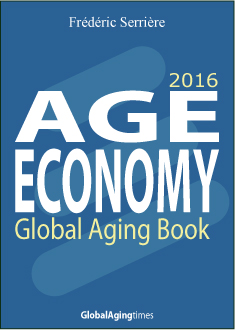Traditionally, the ‘aging’ conversation has been reserved for the 65+audience. However in a world where data is driving more decisions than ever before, McCann Worldgroup’s new “Truth About Age” study finds that when it comes to aging, it’s not about the numbers. It’s about the individual – and knowing people as full humans rather than just making assumptions based on a singular demographic number-age.
The Truth About Age” not only sheds a light on aging across the ages, but importantly across markets and cultures, taking a deep dive into the truths that drive the perceptions, attitudes and behaviors that shape marketing in the shifting global and local landscape.
Recognizing both the importance of the Japanese market in the conversation about aging, and the importance of the Tokyo office to the McCann Worldgroup network, this is the first time a global Truth Study will be launched outside of New York City.
The study found that 25% of people in Japan believe aging is more a problem for men (compared to 15% globally), the only country in the world to hold this attitude. The study also revealed that aging is a major problem for the young in Japan who experience anxiety about future prospects as a result of a rapidly aging population.
These findings were among many in the “Truth About Age,” a new worldwide study conducted by McCann Truth Central, McCann Worldgroup’s global intelligence unit. The large-scale study surveyed nearly 24,000 people, aged 20 through 70, across 28 markets*, supplemented by qualitative research in 35 markets* around the globe and revealed an important shift in global dynamics when it comes to attitudes and behaviors about aging, across the age spectrum, and points to the need for traditional ways of approaching targeting and segmentation to be reimagined. As such, Truth about Age also introduces a new marketing playbook to approaching age across the spectrum.
“We’re at a pivotal moment in human history, where traditional age norms are being challenged across every age group and marketers must respond to this new reality,” said Suzanne Powers, Global Chief Strategy Officer, McCann Worldgroup. “It’s time to rethink the playbook with regards to the way brands approach age across the spectrum – not just when it comes to marketing to ‘seniors’ – so they can play a more meaningful role in people’s lives at every life stage.”
“We found that age is becoming a less useful predictor of behaviors and attitudes,” said Nadia TumaWeldon, Senior Vice President, Director, McCann Truth Central, and an author of the study. “Brands need to go beyond the ‘number’ to ensure they are connecting with people of all age groups.”
“Of course, there are many studies of age in Japan, but this is one of the largest to compare attitudes to aging in Japan with other countries around the world. As such, it provides a unique perspective on our market. For example, we discovered that Japan is the only country in the world where men are more concerned about aging than women, and Japan and Korea, quite unexpectedly are the countries least likely to respect the older generation,” said Yoshi Matsuura, Executive Planning Director, Director of the Planning Division, McCann Japan.
McCann has developed the following four principles to help guide marketers as they rethink age-led demographics:
1. Start young: Surprisingly, the study found that people who most feared death were in their 20s, and people who worried least about aging were in their 70s. Smart brands will find ways of reframing the age conversation much earlier.
2. Celebrate the gains: In the second half of life, much of the aging narrative is oriented around loss, yet our data suggests there is much to gain and celebrate. Brands have the opportunity to rewrite the narrative by developing new language and imagery to connect not just with the aging population, but with people of all age groups.
3. Go beyond the number: Age is becoming a less useful predictor of behaviors and attitudes. The traditional approach to targeting and segmentation must be reimagined. Brands need to interrogate their own consumer segmentations in new ways to ensure that they are consistently going beyond the ‘number’.
4. Promote intergenerational connections: Overall, there is one consistent theme that transcends markets when it comes to aging well; spending time with people of different ages. The data shows that the old consistently misunderstand the young and vice versa. There is a rich opportunity for brands to drive a dialogue between the generations and co-create an age-positive future.


